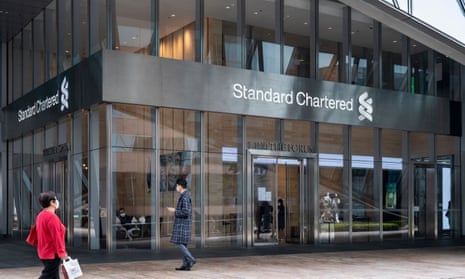Bankers at Standard Chartered have shared a $1.37bn (£1bn) bonus pot for 2021, in the latest sign that financial firms have emerged from the Covid-19 pandemic in better shape than expected.
The payout was up 38% on the previous year and came as the London-headquartered bank reported full-year pretax profits had doubled to $3.3bn, £500m short of analyst expectations
The bank said the payout reflected a return to awarding bonuses after lean returns in 2020 caused by the pandemic, as well as an increasingly competitive hiring market. Banks worldwide are expected to follow suit in order to retain key talent.
US lenders set the trend for increasing bonuses, with Morgan Stanley approving a 6% payment boost for its chief executive James Gorman earlier this year. Meanwhile, JPMorgan Chase approved a 9% bonus increase for Jamie Dimon.
Elsewhere in London, HSBC, Barclays, Lloyds Banking Group and NatWest are expected to pay bonuses totalling more than £4bn when they report their annual results in the next fortnight, beginning with NatWest on Friday.
Combined, the banks’ annual profits are expected to exceed £34bn – the most since 2007 in the boom before the financial crisis.
Gary Smith, the general secretary of the GMB union, which represents 600,000 mostly frontline workers, described increases in banker bonuses as a “kick in the teeth” for people facing the cost of living crisis.
The bigger bonus pool at Standard Chartered came as the bank set out plans to cut annual expenses by $1.5bn, as part of a broader goal to achieve double-digit returns by 2024.
It also unveiled a $750m share buyback plan, lifted its profit targets and promised to increase investment in China by $300m.
It said it expected revenue to grow by an extra 3% a year, and targeted a return on equity of 10% by 2024. It declared a final dividend of 9 cents a share, making a full-year payment of 12 cents a share. This is up 3 cents on the previous year.
“Confidence in our overall asset quality and earnings trajectory allows us to return significant capital to shareholders,” said Bill Winters, the bank’s chief executive.
“We saw a return to income growth, which we believe signals the start of a sustainable recovery, and we finished the year with good business momentum in financial markets, trade and wealth management.”
Winters, now the longest-serving chief executive at a major UK bank, told Reuters he intended to stay on in his role to see through the completion of the plan in 2024.
“We have put a refreshed set of guidance on the table today, I would love to deliver that guidance and deliver that package … it’s more than just sharpening up the financials, it’s changing the way that we operate,” he said.
Richard Hunter, head of markets at Interactive Investor, said Standard Chartered’s results were “disappointingly light of expectations”.
“The company is optimistic on prospects for the coming year, particularly in the fast-growing Asian region where the company has particular focus,” he said.
“In the meantime, however, the key metrics are mixed. Credit impairments for the year showed a marked reduction to $263m from a previous $2.3bn, although did not reach the $156m the market had been expecting due to some further provisions within the Chinese property market.”
